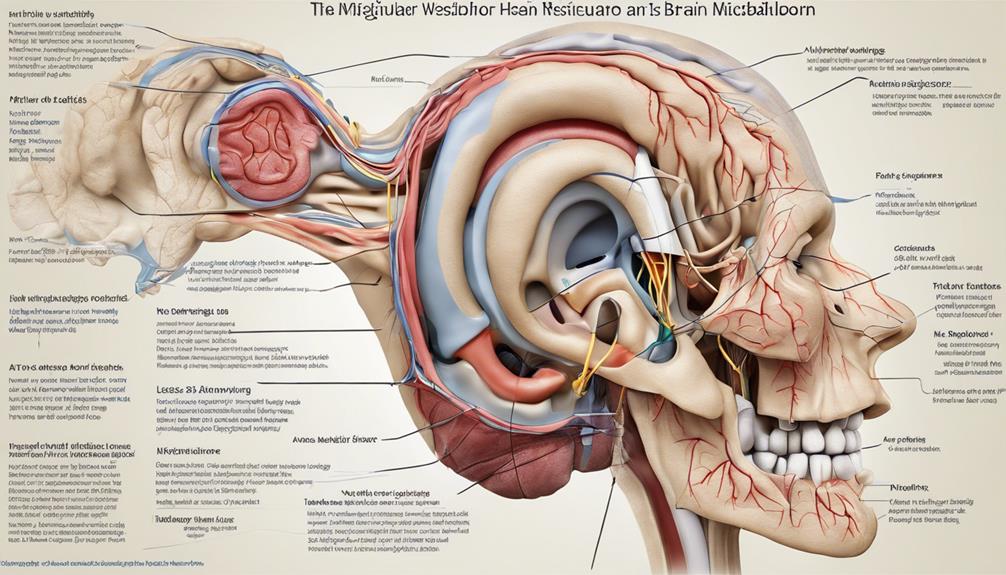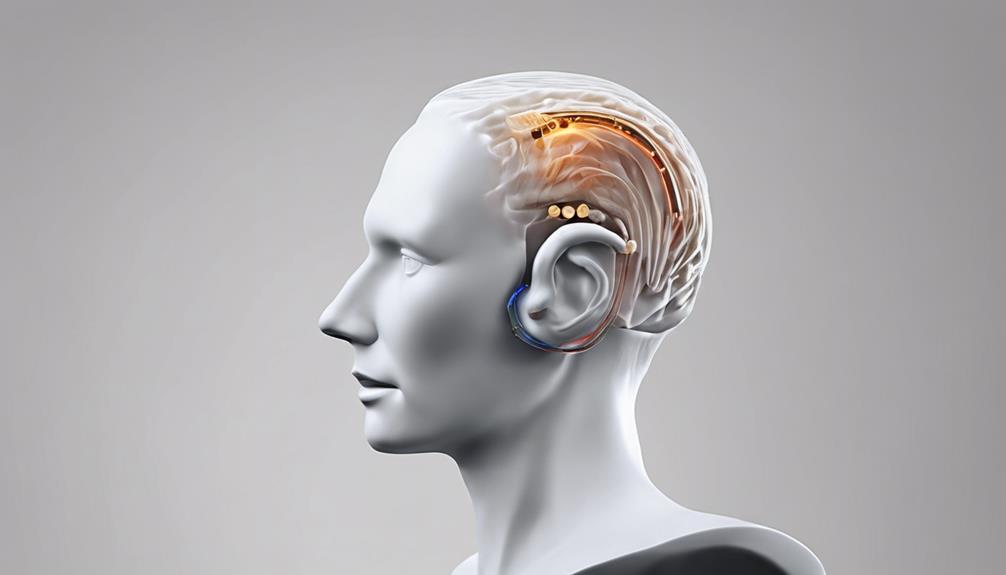Many people find the complex connection between migraines and hearing loss to be fascinating and deserving of further investigation. By examining the relationship between these conditions, we can gain a deeper understanding and shed light on potential similarities in their root causes.
The intricate interplay between auditory function and migraine pathophysiology unveils intriguing insights that could reshape our approach to managing these often coexisting ailments. Stay tuned as we navigate the labyrinth of connections between hearing loss and migraines, unveiling the mysteries that lie within.
Key Takeaways
- Hearing loss triggers neurological changes influencing migraine pathways.
- Auditory deprivation from hearing loss leads to brain reorganization affecting migraines.
- Vestibular system's role in migraines includes heightened sound sensitivity.
- Understanding vestibular system's impact aids in effective migraine symptom management.
The Auditory System and Migraine Triggers
When experiencing migraines, our auditory system can be impacted, potentially leading to hearing issues such as sudden sensorineural hearing loss. Migraines have been linked to changes in the auditory pathways and cochlea, which may result in hearing abnormalities.
During migraines, vasospasms can occur, disrupting the blood supply to the auditory system and increasing the risk of sudden sensorineural hearing loss. The compromised blood flow during these episodes can also damage the structures of the inner ear, further impacting hearing.
Due to the potential connection between migraines and auditory symptoms, it's essential for migraine sufferers to undergo regular monitoring of their hearing. Understanding how migraines affect the auditory system is crucial in recognizing the early signs of hearing loss and seeking appropriate interventions.
Understanding Sensory Disturbances in Migraines

Exploring the sensory disturbances present in migraines provides valuable insight into the early warning signs that precede the onset of a headache. In the realm of migraines, sensory disturbances manifest in various forms, offering crucial cues about an impending attack. Here are three key sensory disturbances commonly associated with migraines:
- Visual Aura: Sudden visual disturbances such as flashing lights or zigzag lines often herald the arrival of a migraine headache, alerting individuals to prepare for the impending pain.
- Sensitivity to Light: Heightened sensitivity to light, medically known as photophobia, can intensify during a migraine episode, causing discomfort and prompting individuals to seek darker environments.
- Auditory and Vestibular Sensations: Some migraine sufferers experience auditory disturbances, such as tinnitus or ear fullness, alongside vestibular symptoms like dizziness or vertigo, highlighting the intricate relationship between migraines and the auditory system.
Understanding these sensory changes not only enhances the recognition of migraine attacks but also aids in the proactive management of symptoms, ultimately empowering individuals to navigate through migraines more effectively.
Neurological Impact of Hearing Loss
Understanding the neurological ramifications of hearing loss is crucial in unraveling its impact on the development and manifestation of migraines. When experiencing hearing loss, the brain undergoes intricate changes that can affect various neurological pathways associated with migraine susceptibility.
Auditory deprivation resulting from hearing loss might initiate cortical reorganization in the brain, potentially heightening one's vulnerability to migraines. The brain's compensatory mechanisms in response to hearing loss could play a significant role in influencing the onset and severity of migraine symptoms.
Research indicates that the brain's reaction to auditory deficits caused by hearing loss may actively contribute to the pathophysiology of migraines. This intricate interplay between hearing loss and migraines underscores the importance of understanding how alterations in brain function due to hearing impairment can impact the development and progression of migraines.
Such insights are vital for devising comprehensive management and treatment strategies tailored to address the neurological complexities at the intersection of hearing loss and migraines.
Link Between Vestibular System and Migraines

The vestibular system's intricate connection to migraines underscores its pivotal role in causing dizziness, vertigo, and balance issues characteristic of vestibular migraines. When exploring the link between the vestibular system and migraines, several key points emerge:
- Spatial Orientation: The vestibular system plays a crucial role in our ability to orient ourselves in space. Disruptions in this system can lead to spatial disorientation, a common symptom in vestibular migraines.
- Sensitivity to Sound: Vestibular migraines are often accompanied by an increased sensitivity to sound. This heightened sensitivity can exacerbate migraine symptoms and contribute to the overall sensory overload experienced during an attack.
- Changes in Hearing Perception: Individuals with vestibular migraines may also experience changes in their hearing perception. These changes can range from mild fluctuations in hearing sensitivity to more pronounced alterations in how sounds are processed by the brain.
Understanding how the vestibular system influences migraines is vital in managing symptoms effectively and pursuing suitable treatment options.
Addressing Migraine Treatment Strategies
When addressing migraine treatment strategies, lifestyle modifications play a key role in managing symptoms effectively. Maintaining regular sleep patterns, managing stress, and incorporating healthy dietary habits can all contribute to reducing the frequency and intensity of migraine attacks.
Medications like triptans are commonly prescribed to help alleviate acute migraine symptoms, while preventive drugs may be recommended for individuals with frequent or severe migraines. In addition to pharmacological interventions, non-pharmacological approaches such as acupuncture and biofeedback can serve as valuable complements to traditional migraine treatments.
Identifying and avoiding migraine triggers, such as certain foods, hormonal changes, or environmental factors, is essential for preventing migraine episodes. Patient education on self-management techniques is crucial in empowering individuals to take control of their migraines and minimize their impact on daily life.
Frequently Asked Questions
Can Hearing Problems Cause Migraines?
Yes, hearing problems can cause migraines. Sudden sensorineural hearing loss and changes in hearing function may trigger migraines in susceptible individuals. These alterations in neurological pathways can lead to the development or exacerbation of migraines.
Addressing hearing issues promptly may help manage or prevent migraine episodes. The association between hearing loss and migraines suggests a bidirectional relationship that requires attention for effective treatment.
What Is an Auditory Migraine?
Sure thing!
An auditory migraine is a type of migraine that specifically affects the auditory system, causing symptoms like hearing loss, tinnitus, and vertigo. This condition can lead to sudden sensorineural hearing loss and sensitivity to sound.
Understanding auditory migraines is crucial for managing associated hearing issues effectively. It's essential to recognize the unique symptoms and challenges that come with this type of migraine to provide appropriate care and support.
How Does a Hearing Impairment Affect You Emotionally?
Hearing impairment can impact us emotionally by causing feelings of isolation, frustration, and depression due to communication challenges. Coping with these emotions involves seeking support from loved ones, counseling, or support groups.
Addressing the emotional aspects of hearing loss is crucial for our mental health and overall well-being. Effective communication strategies and assistive devices can help alleviate emotional distress related to hearing impairment.
Are Migraines Connected to Ears?
Yes, migraines are connected to ears. Inner ear structures like the cochlea and vestibular system play a role in this connection. Symptoms such as fluctuating hearing loss, vertigo, and balance issues can arise.
Changes in blood supply during migraines may contribute to these issues. Monitoring hearing regularly is crucial for migraine patients to address any auditory symptoms that may arise.
Conclusion
In conclusion, the intricate relationship between hearing loss and migraines sheds light on the importance of early detection and treatment.
Just as a symphony relies on each instrument playing in harmony, our bodies depend on the delicate balance of our auditory and neurological systems.
By recognizing the signs and symptoms of both conditions, we can better orchestrate our health and well-being for a harmonious future.










